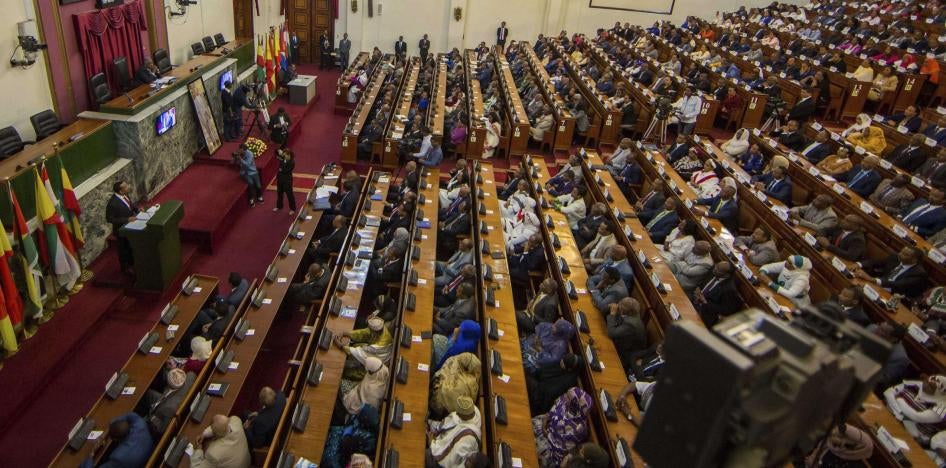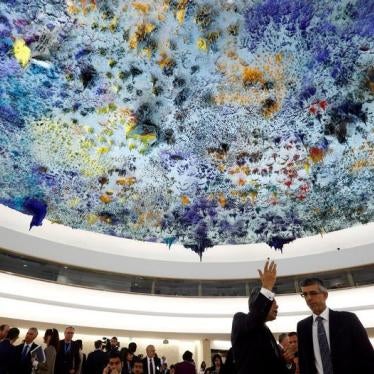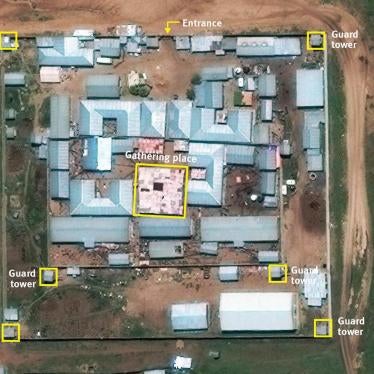One year ago this month, Dr. Abiy Ahmed was sworn in as prime minister of Ethiopia. His first few months in office saw many positive human rights reforms and a renewed sense of optimism following several years of protests and instability, along with decades of repressive authoritarian rule. Thousands of political prisoners have been released, a peace agreement has been signed with neighboring Eritrea, and Abiy has pledged to reform repressive laws. But in the months that followed, growing tensions and conflicts, largely along ethnic lines, have resulted in significant displacement and a breakdown in law and order across much of the country, threatening progress on key reforms.
This week we will publish a series of assessments of Prime Minister Abiy’s first year in office, looking at his government’s performance regarding eight key human rights priorities and providing recommendations on what more needs to be done in his second year in office, leading up to elections scheduled for May 2020.
Today, in Part 6 of 8, we look at the government’s performance on Democratic Institutions and Political Space.
Democratic Institutions and Political Space
While progress has been made, much more work needs to be done ahead of the May 2020 elections. The release of opposition leaders, opposition parties’ newfound freedom of operation, and Abiy’s efforts to hold constructive dialogues with opposition parties are all significant changes, representing concrete steps toward opening political space and creating plurality.
The appointments of independent figures to lead the Electoral Board and the Supreme Court are positive steps that symbolize a desire for institutional independence, but the government hasn’t yet made significant progress toward systemic reform of these institutions. Achieving real independence will take time, and with elections just over one year away, expectations are that electoral reforms would have been further long.
Background
The ruling coalition and its affiliates won all 547 seats in parliament in 2015, the most recent elections, and 546 seats in the previous election, in 2010. Opposition parties have regularly reported numerous barriers to their meaningful participation in these elections, including arrest and harassment of their candidates and supporters. Restrictions on opposition parties and the government’s use of its control over basic services as leverage left many citizens, particularly in rural areas, little choice but to support the ruling party come election time. The EPDRF ensured that political plurality was nonexistent.
Institutions including the Human Rights Commission, National Electoral Board of Ethiopia, and the judiciary have exhibited little independence from the ruling party. Human Rights Commission investigations have lacked basic elements of impartiality, and few results have been made public. The National Electoral Board of Ethiopia (NEBE) has been criticized repeatedly as being under the ruling coalition’s control, and political interference in party and candidate registration has been a longstanding problem. Courts have shown little independence during politically charged trials. Many opposition politicians, journalists, and activists were convicted under the repressive 2009 anti-terrorism law and sentenced to lengthy prison terms. The authorities did not investigate reports of torture.
Under Abiy
Prime Minister Abiy has expressed his commitment to electoral reforms. He has consulted regularly with opposition parties, including in December, when he held discussions “on highlighting the reforms required to ensure the upcoming election is free and fair, and the shared responsibilities of all.” He has stated that the reforms will not interfere with the electoral calendar, with the election currently scheduled for May 2020. Local elections have been postponed several times, however, and no timetable for them has been issued. The government and over 100 opposition parties in March signed a code of conduct for the elections. The status of the EPRDF coalition is unclear given tensions between the Tigrayan Peoples Liberation Front (TPLF) and Oromo Democratic Party (ODP) (renamed this year from the Oromo People’s Democratic Organization, or OPDO) and the uncertain future of the Southern Ethiopian Peoples’ Democratic Movement (SEPDM), the ruling party in the SNNPR.
Thousands of opposition members were released from detention or allowed to return from exile when Abiy came to power. He has removed opposition groups from the list of terrorist organizations, and expressed his desire for political plurality, stating that the country had “no option” but multiparty democracy. Exiled opposition leaders were welcomed back into Ethiopia and now operate without restriction, although some opposition parties have reported difficulties in holding rallies in some areas due to a lack of security and protection.
A former opposition leader, lawyer, and judge, Birtukan Midekssa, was named head of the NEBE in November, a crucial first step toward its independence. She is highly respected and, crucially, independent of the ruling party, although other electoral reforms have been slow in coming. Ethiopia’s draft Universal Periodic Review (UPR) submission states that planned electoral reforms are “expected to shift Ethiopia’s electoral system from first-past-the-post to a mix between proportional and first-past-the-post systems.”
Steps have been taken toward increasing the independence of the judiciary, including the appointment in November of a former judge and activist, Meaza Ashenafi, as president of the Supreme Court. Human Rights Watch has received reports recently of detainees being asked by judges about how they are treated in detention – which generally did not happen in the past.
There were no evident changes to the Human Rights Commission in Abiy’s first year and Human Rights Watch does not know whether it undertook any investigations during the year. No investigations have been made publicly available during Abiy’s first year. The appointment of a new chair is expected in the coming months.
The long-awaited census, which the constitution says should be held every 10 years but was last held in 2007, was again postponed in March. It is not clear when it will be held.
What more can be done
With the national elections scheduled for May 2020, much work remains to be done to create a situation conducive to a free vote. The census should be completed well ahead of the elections. Political parties should be able to hold rallies without obstruction or threat of violence. Law and order needs to be restored in large parts of the country. Political party registration should not be arbitrarily withheld or obstructed. Civil society and the media have a key role to play in voter education and ensuring that elections are peaceful.
While acknowledging that a long-term approach will be needed to improve the independence and capacity of institutions, the government needs to make further efforts to increase their independence and to build confidence that these institutions are capable of resolving grievances in an impartial manner. First steps should be taken to increase the independence of the Human Rights Commission, including the appointment of a chair who is independent of the ruling party.









